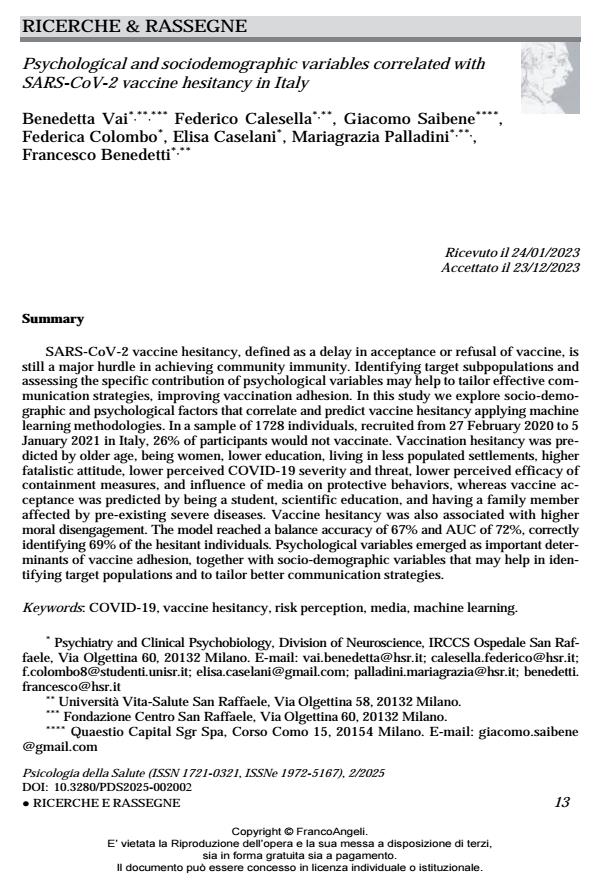Psychological and sociodemographic variables correlated with SARS-CoV-2 vaccine hesitancy in Italy
Journal title PSICOLOGIA DELLA SALUTE
Author/s Benedetta Vai, Federico Calesella, Giacomo Saibene, Federica Colombo, Elisa Caselani, Mariagrazia Palladini, Francesco Benedetti
Publishing Year 2025 Issue 2025/2
Language English Pages 19 P. 13-31 File size 254 KB
DOI 10.3280/PDS2025-002002
DOI is like a bar code for intellectual property: to have more infomation
click here
Below, you can see the article first page
If you want to buy this article in PDF format, you can do it, following the instructions to buy download credits

FrancoAngeli is member of Publishers International Linking Association, Inc (PILA), a not-for-profit association which run the CrossRef service enabling links to and from online scholarly content.
SARS-CoV-2 vaccine hesitancy, defined as a delay in acceptance or refusal of vaccine, is still a major hurdle in achieving community immunity. Identifying target subpopulations and assessing the specific contribution of psychological variables may help to tailor effective communication strategies, improving vaccination adhesion. In this study we explore socio-demographic and psychological factors that correlate and predict vaccine hesitancy applying machine learning methodologies. In a sample of 1728 individuals, recruited from 27 February 2020 to 5 January 2021 in Italy, 26% of participants would not vaccinate. Vaccination hesitancy was predicted by older age, being women, lower education, living in less populated settlements, higher fatalistic attitude, lower perceived COVID-19 severity and threat, lower perceived efficacy of containment measures, and influence of media on protective behaviors, whereas vaccine acceptance was predicted by being a student, scientific education, and having a family member affected by pre-existing severe diseases. Vaccine hesitancy was also associated with higher moral disengagement. The model reached a balance accuracy of 67% and AUC of 72%, correctly identifying 69% of the hesitant individuals. Psychological variables emerged as important determinants of vaccine adhesion, together with socio-demographic variables that may help in identifying target populations and to tailor better communication strategies.
Keywords: COVID-19, vaccine hesitancy, risk perception, media, machine learning.
Benedetta Vai, Federico Calesella, Giacomo Saibene, Federica Colombo, Elisa Caselani, Mariagrazia Palladini, Francesco Benedetti, Psychological and sociodemographic variables correlated with SARS-CoV-2 vaccine hesitancy in Italy in "PSICOLOGIA DELLA SALUTE" 2/2025, pp 13-31, DOI: 10.3280/PDS2025-002002